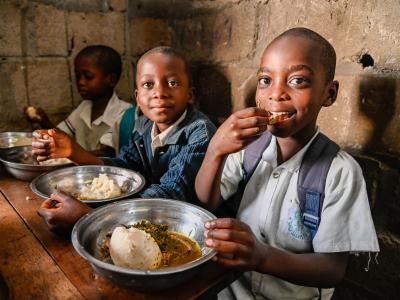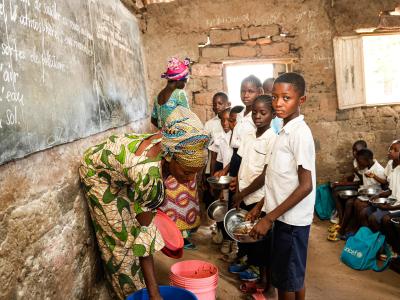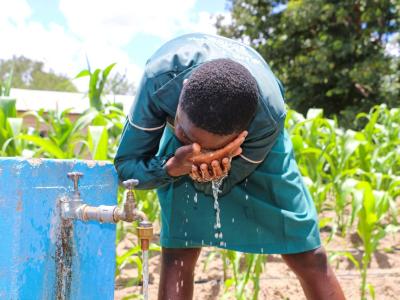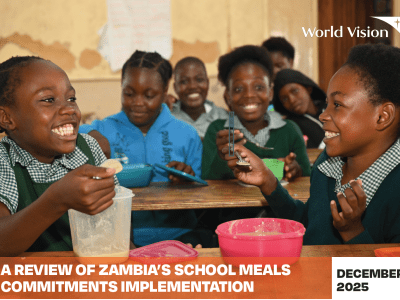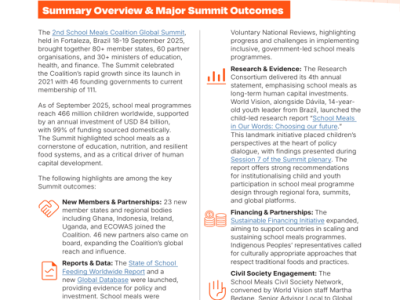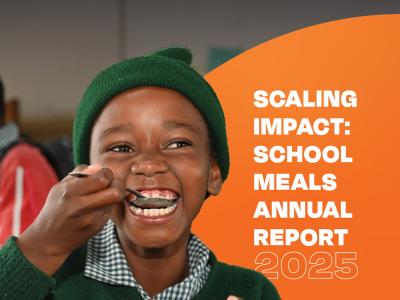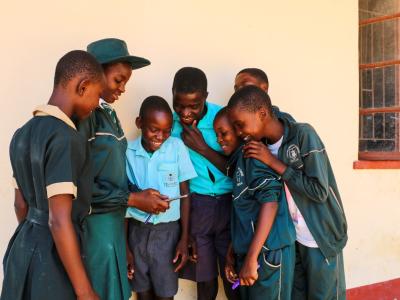article / January 26, 2026
DR Congo - Kalemie: From Water to School Meals, Safer Schools and Stronger Learning
Integrated WASH and school meals in Kalemie improve clean water, hygiene, and nutrition, boosting pupils’ health, protection, attendance, learning, and dignity.
article / February 13, 2026
DR Congo: 74,731 children fed at school, but millions still waiting
This story highlights the urgent challenge of child hunger and education in the Democratic Republic of Congo, where more than 29 million students are enrolled for the 2025–2026 school year, yet only a fraction benefit from school feeding programmes. Through the voices of Valence and Jean, two 11-year-old pupils at TCHABILWA Primary School in Kalemie, Tanganyika Province, the article brings statistics to life. For them, a hot meal at school is more than food; it is energy to learn, play, and dream. Their joy reflects the impact of World Vision’s school feeding programme, which reached 74,731 children in Kasai and Tanganyika during the 2025 fiscal year. The results are encouraging: school enrolment in supported schools has significantly increased, especially among girls. Yet the needs remain overwhelming. Attendance gaps, dropouts, and the millions of children still unreached reveal the scale of the crisis. Ultimately, the story is both hopeful and urgent, showing how a simple meal can keep a child in class, while calling for greater investment and partnerships to ensure that many more children across the DRC are not left behind
article / February 13, 2026
Piped water system brings in new possibilities at Lupane Primary School
Today, 410 school children and 40 households in the surrounding community benefit from the piped water system, improving health, hygiene, and learning outcomes.
publication / December 16, 2025
A Review of Zambia's School Meals Commitments Implementation
World Vision Zambia is dedicated to improving the well-being of vulnerable populations, particularly children, who are constantly threatened by hunger and malnutrition. Zambia faces significant challenges, with 32% of children stunted and widespread micronutrient deficiencies.
publication / December 11, 2025
Outcomes Report: 2nd School Meals Coalition
Key outcomes from the 2nd School Meals Coalition Summit: new commitments, evidence launches, financing, and World Vision’s global advocacy leadership.
publication / November 26, 2025
School Meals Annual Report FY25
Millions of children still go to school hungry, with a single meal often deciding whether they stay in class or drop out. While 466 million now receive school meals, half of primary school-aged children remain unreached—especially in low-income countries. World Vision’s School Meals Programme delivered daily meals to over one million children in 20 countries and drove 17 policy changes to strengthen national feeding systems. From South Sudan’s new strategy to Rwanda’s citizen-led “Dusangire Lunch,” momentum is building to end child hunger for good.
article / February 20, 2026
ENOUGH food for every child: How World Vision is protecting children like Karabo
No child should face hunger. Karabo’s story shows how World Vision’s ENOUGH Campaign is protecting vulnerable families and restoring childhood hope.
article / February 13, 2026
From Limited Resources to Limitless Learning: A Digital Leap for Lupane Primary School
For the children at Lupane Primary School, the tablets are more than technology, they are windows to new possibilities, inspiring dreams, building skills, bridging the digital divide and bringing hope that every child, no matter where they live, can succeed.
